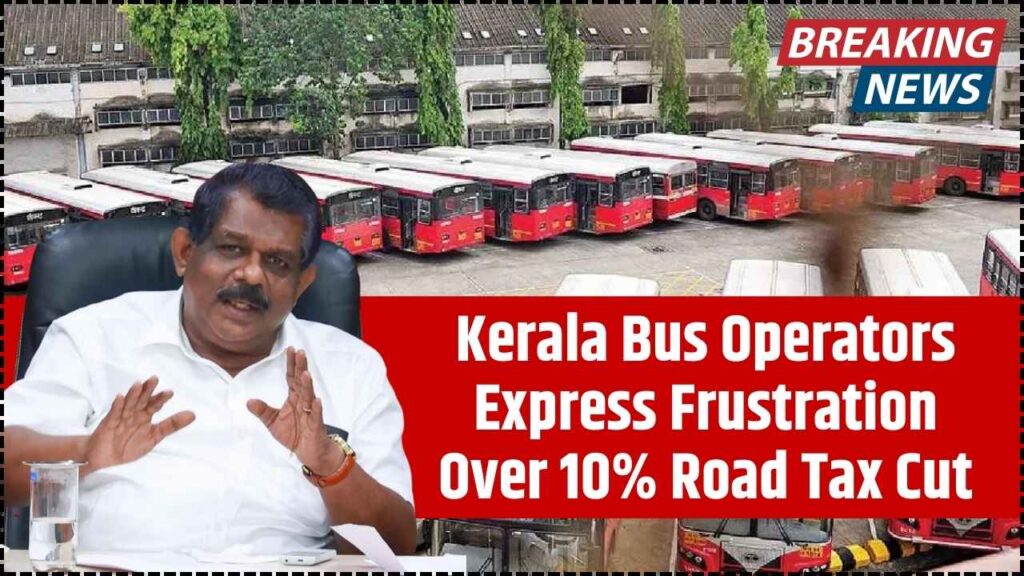
Kerala Bus Operators Express Frustration: The Kerala State Government recently announced a 10% reduction in road tax for certain categories of passenger vehicles, aiming to ease the financial burden on private bus operators. However, instead of relief, this move has sparked frustration among Kerala’s private bus owners, who argue that the reduction is insufficient to compensate for their rising operational costs.
This article explores the impact of the road tax cut, the concerns of bus operators, and what this means for Kerala’s public transport system.
Kerala Bus Operators Express Frustration
| Feature | Details |
|---|---|
| Policy Change | 10% road tax cut for specific buses |
| Affected Vehicles | Heavy passenger buses (push-back seat and sleeper berth) |
| Current Road Tax (Push-Back Seats) | ₹1,300 per seat per quarter |
| New Road Tax (Push-Back Seats) | ₹1,200 per seat per quarter |
| Current Road Tax (Sleeper Berth Buses) | ₹1,800 per berth per quarter |
| New Road Tax (Sleeper Berth Buses) | ₹1,500 per berth per quarter |
| Private Bus Operators’ Response | Dissatisfaction, demand for greater relief |
| Official Source | Kerala Finance Ministry |
The 10% road tax reduction for Kerala’s private bus operators has failed to bring significant relief, sparking widespread frustration among industry players. While the government argues that this cut balances fiscal responsibility with operator support, bus owners insist that more needs to be done. The possibility of strikes, route reductions, and increased fares could disrupt Kerala’s already fragile public transport system.
Why Are Bus Operators Unhappy?
While a 10% road tax reduction may seem beneficial, bus operators argue that it barely offsets the financial challenges they face. Here’s why:
1. Rising Fuel and Maintenance Costs
- Diesel prices have seen a significant rise in the past few years.
- Spare parts, labor charges, and vehicle maintenance costs have surged.
- Insurance premiums for commercial vehicles have also increased.
“The road tax cut is too little, too late. Our operational costs have tripled, and this reduction does nothing to help.” – Kerala Private Bus Operators’ Association.
2. Declining Passenger Numbers
- The COVID-19 pandemic has changed travel patterns, with more people opting for personal vehicles and ride-sharing apps.
- Students and office-goers, a key segment of bus passengers, have shifted to online learning and remote work.
3. Unfair Taxation Structure
- Private bus operators feel that the tax burden is disproportionately high, compared to state-run buses (KSRTC), which receive government subsidies.
- The tax structure does not consider variations in route profitability, meaning rural and small-route buses suffer more.
How Does This Impact Kerala’s Public Transport System?
The discontent among bus operators could have negative consequences for Kerala’s public transport system:
1. Increased Ticket Prices
- If operational costs remain high, bus fares may rise, making public transport more expensive for daily commuters.
2. Reduced Bus Services
- Many bus owners have already stopped services on certain routes due to unprofitability.
- More route cancellations could leave commuters with fewer travel options, especially in rural areas.
3. Potential for Strikes and Protests
- The Private Bus Operators’ Association has hinted at a possible statewide strike to demand further relief.
- Past protests have led to service disruptions, causing hardships for students, office workers, and daily wage earners.
What Are the Bus Operators Demanding?
Private bus owners and operators have put forth several demands to the Kerala government:
- Increase the tax reduction from 10% to at least 30% to significantly lower operational costs.
- Introduce diesel subsidies for private buses, similar to benefits received by government-run KSRTC buses.
- Reduce permit fees and relaxation in annual fitness tests to help bus owners maintain their fleets at lower costs.
- Provide financial aid or relief packages for struggling bus operators affected by the pandemic and economic slowdown.
Odisha Cabinet Approves Unified Pension Scheme for Government Employees Along with 10 More Proposals
NIFTs Fee Structure 2025: Check Category/Semester-wise Fee for UG & PG Courses, Components
EPFO Extends UAN and Aadhaar Seeding Deadline to February 15 – Here’s What You Need to Know
Government’s Justification for the 10% Tax Cut
The Kerala government maintains that the 10% tax reduction is a balanced approach, offering relief without severely impacting state revenue.
- The Kerala Finance Ministry argues that further reductions could strain the state’s finances, affecting development projects.
- Officials believe that private bus operators should explore modernization and digital ticketing to attract more passengers.
FAQs On Kerala Bus Operators Express Frustration
1. Which buses are eligible for the 10% tax cut?
The tax reduction applies to heavy passenger buses, particularly those with push-back seats and sleeper berths.
2. Will this tax cut reduce bus ticket prices?
Unlikely. Bus operators argue that the reduction is too small to lower ticket prices, given high fuel and maintenance costs.
3. Are government buses (KSRTC) affected by this tax cut?
No, state-run KSRTC buses already benefit from government subsidies and are not included in this tax reduction.
4. Could bus operators go on strike?
Yes. The Private Bus Operators’ Association has threatened to protest if their demands are not addressed.
5. How can the government support private bus operators?
- Increasing the tax cut percentage.
- Providing diesel subsidies.
- Offering financial relief for struggling operators.
- Introducing fare subsidies for passengers to encourage public transport use.










